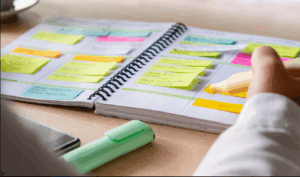In a world that constantly demands our attention, learning how to plan your day isn’t just a productivity hack — it’s an act of self-care. When you start your morning with clarity and intention, you’re not simply organizing tasks; you’re creating space for calm, focus, and meaningful progress.
Whether you’re a student juggling assignments or a professional managing endless meetings, knowing how to plan your day effectively can help you stay grounded and achieve more with less stress. Let’s explore practical steps to design your day with purpose and balance.

1. Start with a Morning Mindset Ritual
Before diving into your to-do list, take a few quiet minutes to center yourself. Planning your day starts with your mindset — how you feel will shape how you perform.
Try a short ritual each morning:
-
Reflect: What matters most today?
-
Affirm: “I choose progress over perfection.”
-
Visualize: Imagine completing your top task calmly and confidently.
This simple morning grounding practice helps your mind focus on priorities and gives your day emotional direction. When you understand how to plan your day from a place of intention, you create a foundation for success.
2. Prioritize with the 3-Task Rule
When your to-do list feels never-ending, it’s easy to lose focus. That’s why one of the best ways to master how to plan your day is by following the “3-Task Rule.”
Here’s how it works:
-
One high-impact task – something that moves you closer to a meaningful goal.
-
One maintenance task – something that keeps your life or work running smoothly.
-
One personal task – something that nurtures your well-being.
This method ensures balance and helps prevent burnout. By narrowing your focus to three essential tasks, you channel your energy into what truly matters rather than spreading yourself thin.
3. Time-Block Your Day for Deep Focus
One of the most powerful strategies in how to plan your day effectively is time-blocking. Instead of multitasking or reacting to every new email, divide your day into structured blocks of focused time.
For example:
-
Deep Work (90–120 mins): Tackle complex or creative tasks.
-
Admin Zone (30–60 mins): Handle emails, calls, or scheduling.
-
Recharge Time (15–30 mins): Stretch, walk, or simply breathe.
You can use tools like Google Calendar or a daily planner template to visualize these blocks. Protect your “deep work” sessions like sacred time — this is when your best, most meaningful work happens.
When you block time intentionally, you’re not just organizing your schedule; you’re learning how to plan your day around your energy, focus, and natural productivity rhythms.
4. Minimize Distractions and Protect Your Focus
Even the best-planned day can be derailed by constant distractions. Mastering how to plan your day also means creating boundaries that protect your attention.
Here are simple strategies:
-
Silence unnecessary notifications.
-
Use “Do Not Disturb” mode during key tasks.
-
Keep your phone out of reach during focus sessions.
-
Close extra tabs or apps that you don’t need.
You’ll be amazed how much more productive you feel when your mind isn’t constantly switching between tasks. Remember: focus is your greatest asset — guard it well.
5. End with Reflection and Reset
At the end of the day, take 5–10 minutes to review your progress. Reflecting helps you improve your process for tomorrow and understand how to plan your day even better next time.
Ask yourself:
-
What did I accomplish today?
-
What could I adjust tomorrow?
-
What made me feel proud or fulfilled?
This reflection builds awareness and prevents burnout. You can also note unfinished tasks for the next day — without guilt — so your mind feels clear before resting.
Why Planning Your Day Matters
When you learn how to plan your day intentionally, you’re not just filling your hours — you’re reclaiming your time and energy. It’s about aligning your daily actions with what truly matters to you. Productivity isn’t about cramming in as much as possible; it’s about creating balance, focus, and peace of mind.
Some days will flow smoothly, and others might feel chaotic — and that’s okay. What matters most is showing up with clarity and adjusting as you go. When you plan your day thoughtfully, you not only achieve more but also feel more grounded, confident, and fulfilled.
So, as you prepare for tomorrow, pause and ask yourself:
-
What do I want to feel at the end of the day?
-
Which one task would make me proud to complete?
-
How can I create moments of rest and joy in between?
Because the most productive day isn’t the busiest — it’s the one that leaves you feeling accomplished, peaceful, and ready to begin again.
✨ If you enjoyed learning how to plan your day for better focus and balance, you might also like our blog on Easy Steps to Make a Study Plan.
It’s packed with practical strategies to help you stay consistent, manage your time wisely, and reach your study goals with confidence!
